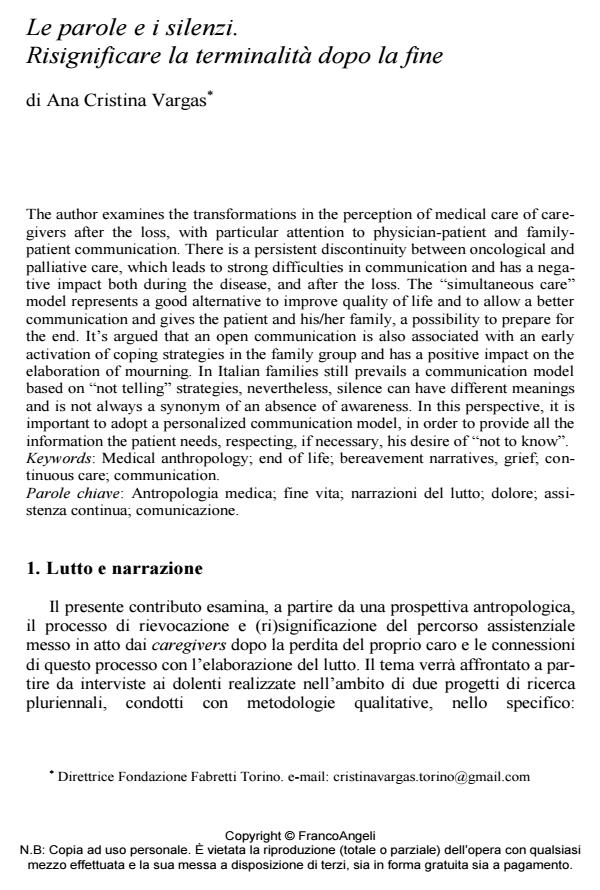Le parole e i silenzi. Risignificare la terminalità dopo la fine
Journal title SALUTE E SOCIETÀ
Author/s Ana Cristina Vargas
Publishing Year 2015 Issue 2015/3
Language Italian Pages 15 P. 102-116 File size 304 KB
DOI 10.3280/SES2015-003009
DOI is like a bar code for intellectual property: to have more infomation
click here
Below, you can see the article first page
If you want to buy this article in PDF format, you can do it, following the instructions to buy download credits

FrancoAngeli is member of Publishers International Linking Association, Inc (PILA), a not-for-profit association which run the CrossRef service enabling links to and from online scholarly content.
The author examines the transformations in the perception of medical care of caregivers after the loss, with particular attention to physician-patient and familypatient communication. There is a persistent discontinuity between oncological and palliative care, which leads to strong difficulties in communication and has a negative impact both during the disease, and after the loss. The "simultaneous care" model represents a good alternative to improve quality of life and to allow a better communication and gives the patient and his/her family, a possibility to prepare for the end. It’s argued that an open communication is also associated with an early activation of coping strategies in the family group and has a positive impact on the elaboration of mourning. In Italian families still prevails a communication model based on "not telling" strategies, nevertheless, silence can have different meanings and is not always a synonym of an absence of awareness. In this perspective, it is important to adopt a personalized communication model, in order to provide all the information the patient needs, respecting, if necessary, his desire of "not to know".
Keywords: Medical anthropology; end of life; bereavement narratives, grief; continuous care; communication.
- Folkman S., Lazarus R., Gruen R.J., DeLongis A. (1986). Appraisal, Coping, Health Status, and Psychological Symptoms. Journal of Personality and Social Psychology, vol. 50, 3: 571-579. DOI: 10.1037/0022-3514.50.3.57
- Good B. (1994). Medicine, rationality and experience. An anthropological perspective. Cambridge: Cambridge University Press. (trad. it. Narrare la malattia. Lo sguardo antropologico sul rapporto medico-paziente, Torino: Einaudi, 2000)
- Good B. (2006). Un corpo che soffre. La costruzione di un mondo di dolore cronico, In: Quaranta I., a cura di, Antropologia Medica. I testi fondamentali. Milano: Raffaello Cortina
- Hank K., Jurges H. (2010). The last year of life in Europe: regional variations in functional status and sources of support. Ageing and Society, vol. 30, 6: 1041–54. DOI: 10.1017/S0144686X1000028
- Kleinman A. (1988). The illness narratives: suffering, healing, and the human condition. New York: Basic Books
- Marzano M. (2004). Scene finali. Morire di cancro in Italia. Bologna: Il Mulino
- Menaca A., Evans N., Andrewa E.V.W., Toscani F., Finetti s., Gómez-Batiste X., Higginson
- I.J., Harding R., Pool R., Gysels M. (2011). End-of-life care across Southern Europe: A critical review of cultural similarities and differences between Italy, Spain and Portugal. Critical Reviews in Oncology/Hematology, vol 82, 3: 387-401. DOI: 10.1016/j.critrevonc.2011.06.00
- Osservatorio sulla condizione assistenziale dei malati oncologici (2013). 5° Rapporto sulla condizione assistenziale dei malati oncologici, pp. 94-106
- Sarbin T.R. (1986). The narrative as a root metaphor for psychology, In: Sarbin T.R., a cura di, Narrative psychology: The storied nature of human conduct. New York: Praeger, pp. 1 – 37
- Sozzi M. (2009). Reinventare la morte. Introduzione alla tanatologia. Roma: Laterza0609104819 Valentine C. (2008). Bereavement Narratives: Continuing bonds in the twenty-first century. New York: Routledge
- Vargas A.C. (2015). La “morte innaturale”. Narrazione e rappresentazioni della morte e il lutto, In: Favole A., a cura di, La famiglia di fronte alla morte, Torino: Fondazione Fabretti Editore (in corso di stampa)
- Vovelle M. (1986). La mort et l’Occident de 1300 à nos jours, Paris : Gallimard, (trad. it., La morte e l’Occidente. Dal 1300 ai giorni nostri, Roma: Laterza, 2000)
- Walter T. (1999). On bereavement. The culture of grief. Buckingham-Philadelphia: Open University Press
- Walter T. (2000). Grief narratives: The role of medicine in the policing of grief. Anthropology & Medicine, 7 (1): 97-114. DOI: 10.1080/13648470010937
- Woods A. (2011). The limits of narrative: provocations for the medical humanities. Medical Humanities, 37(2): 73-78. DOI: 10.1136/medhum-2011-01004
- Zagonel V. (2013). Cure simultanee: le evidenze e le raccomandazioni, Tavolo AIOM cure simultanee e continuità di cura, I conferenza di consenso sulle cure simultanee AIOM
- Andruccioli J., Raffaeli W. (2005). La consapevolezza di malattia nel paziente oncologico. Rivista italiana di Cure Palliative, 3: 41-50.
- Bosticco C., Thompson T. (2005). Narratives and Story Telling in Coping with Grief and Bereavement. Omega, 51(1): 1-16. DOI: 10.2190/8TNX-LEBY-5EJY-B0H
- Campione F. (2003). Contro la morte. Psicologia ed etica dell’aiuto ai morenti. Bologna: Clueb
- Demetrio D. (1996). Raccontarsi.La narrazione autobiografica come cura di sé. Milano: Raffaelo Cortina
- Douglas M. (1970). Natural Symbols. Explorations in Cosmology. London: Barrie & Rockliff, (trad. it., I simboli naturali. Esplorazioni in cosmologia, Torino: Einaudi, 1979)
Ana Cristina Vargas, Le parole e i silenzi. Risignificare la terminalità dopo la fine in "SALUTE E SOCIETÀ" 3/2015, pp 102-116, DOI: 10.3280/SES2015-003009